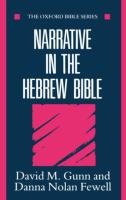Description
After almost two centuries of historical criticism, biblical scholarship has recently taken major shifts in direction, most notably toward literary study of the Bible. Much germinal criticism has taken as its primary focus narrative texts of the Hebrew Bible (the "Old Testament"). This study provides a lucid guide to the interpretive possibilities of this movement. Attempting to be both theoretical and practical, it combines discussion of methods and the business of reading in general with numerous illustrations through readings of particular texts. Gunn and Fewell discuss how literary criticism is related to other dominant ways of reading the text over the last two thousand years. In addition, they address characters, including the narrator and God; plot, modifying recent theory to accommodate the peculiar complexity of biblical narratives; and the play of language through repetition, ambiguity, multivalence, metaphor, and intertextuality. Finally, the authors discuss readers and responsibility, exploring the ideological dimension of narrative interpretation. An extensive bibliography completes the book, arranged by subject and biblical text.
Last updated on
Product Details
- Oxford University Press & Brand
- Jul 29, 1993 Pub Date:
- 9780192132451 ISBN-13:
- 0192132458 ISBN-10:
- 280 Pages
- English Language
- 7.64 in * 5.05 in * 0.82 in Dimensions:
- 1 lb Weight:




